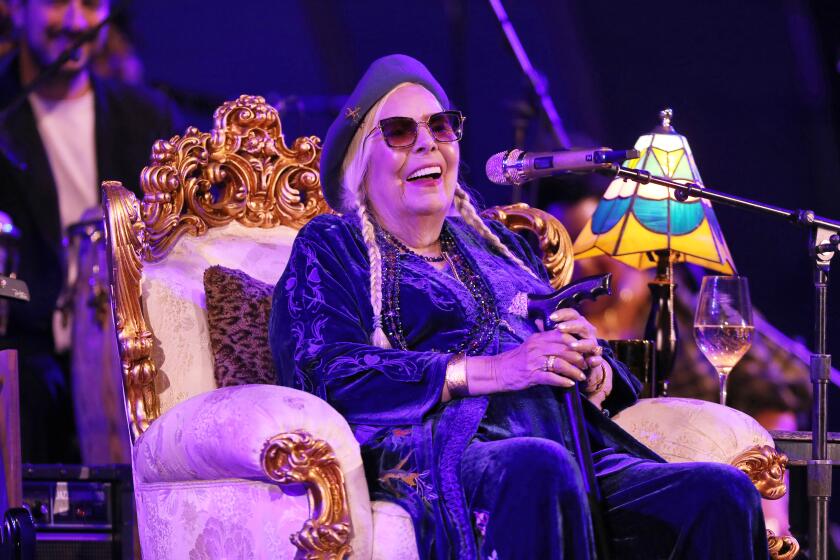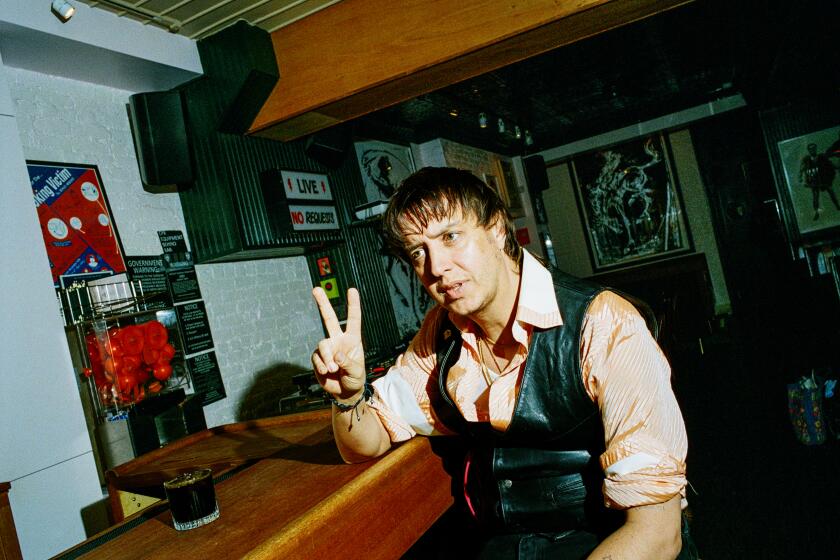On Minor Labels, Yet Still Major Artists
The bump in jazz sales that has followed the widespread promotion and publicity surrounding the Ken Burns PBS documentary has primarily benefited the large record companies. The reason, of course, is that the catalogs of the major-name artists who received the greatest amount of air time in the series are virtually all owned by the big labels.
In the meantime, however, smaller companies continue to do what they have always done--release albums by newly arriving players, by older artists who haven’t quite broken through to the larger audience, by musicians working in genres either too avant-garde, or too retrograde to command significant attention.
Take Chicago’s Delmark Records, for example. Founded in the ‘50s by Bob Koester, at the time a blues and New Orleans jazz enthusiast, the company has become broadly eclectic, issuing recordings ranging from New Orleans classicists to early efforts by the cutting-edge Art Ensemble of Chicago.
The latest group of releases from the company is typical of its willingness to embrace the entire spectrum of jazz. Traditional jazz is covered via four far-ranging reissues:
* Albert Nicholas (with Art Hodes’ All-Star Stompers): “Albert’s Back in Town.” Nicholas succeeded Johnny Dodds as the clarinetist with the King Oliver band, and also played in groups led by Louis Armstrong and Chick Webb. This is the chronicle of a 1959 date in the company of a vigorous group led by pianist Hodes.
* George Lewis: “Hello Central . . . Give Me Doctor Jazz.” Lewis was one of New Orleans-style jazz’s greatest clarinetists. The tracks included here are the definitive 1953 recordings of a band that toured colleges and universities before settling in at New Orleans’ Preservation Hall. Among the players: trombonist Jim Robinson, pianist Alton Purnell and trumpeter Kid Howard.
* New Orleans Ragtime Orchestra: “Grace and Beauty.” In 1967, before “The Sting” brought ragtime into mainstream consciousness, pianist Lars Edegran found some classic rags in Tulane University’s jazz archives and organized the Ragtime Orchestra to perform them. These dates, recorded in 1967 and 1970, feature 18 selections from Scott Joplin, Joseph Lamb and others, performed by an ensemble that adds a brisk rhythmic swing to the original pieces.
* Jim Beebe: “Chicago Jazz Saturday Night Function.” A Chicago staple, trombonist Beebe’s solidly traditionalist ensemble was recorded in 1978-79.
Four other new Delmark recordings display the company’s more stylistically far-reaching pursuits:
* Franz Jackson & the Salty Dogs: “Yellow Fire.” Describing tenor saxophonist Jackson, 88, as a veteran performer doesn’t completely encompass his career. Amazingly, he has been active since the late ‘20s, when he played with pianist Albert Ammons, and continued via associations with Roy Eldridge, Fletcher Henderson, Red Allen and Art Hodes. And on this traditional-style date--recorded last year--he plays soprano and tenor saxes and sings, all with verve and enthusiasm.
* Cecil Payne: “Chic Boom, Live at the Jazz Showcase.” Payne was probably the original bebop baritone saxophonist, soloing with Dizzy Gillespie on items such as “Ow” and “Stay on It.” Here, in a date last August, he remains in bebop mode, leading a sextet (featuring trumpeter Jim Rotondi, tenor saxophonist Eric Alexander and pianist Harold Mabern) through a program dominated by Payne originals.
* Roy Campbell: “Ethnic Stew and Brew.” Trumpeter Campbell, whose playing seems influenced by both Don Cherry and Lester Bowie, performs a set of ethnically tinged, avant-garde styled improvisations in a trio context.
* Scott Fields Ensemble: “Mamet.” Guitarist Fields, in his first Delmark outing, comes up with one of the most thematically unusual jazz efforts of recent memory, a set of pieces described as “musical interpretations of actions and dialogue” from the plays of David Mamet.
Another small, even less visible company, Nagel Heyer Records, produces well-recorded albums dedicated to a specific genre. Named after its German founders, Hans and Sabine Nagel-Heyer, the label was established in 1992. Its mission, from the beginning, has been “to present the finest in Mainstream, Swing and Dixieland.” More than 70 titles have been released thus far, and the company was named record label of the year in 1998 by Jazz Journal International. Some of the more attractive recent offerings from Nagel Heyer include:
* The International All-Stars “Play Benny Goodman.” Featuring the marvelous clarinet work of Ken Peplowski.
* Wycliffe Gordon: “The Search.” The former Lincoln Center Jazz Orchestra trombone stalwart (and winner of the Down Beat 2000 critics poll on his instrument) with an ensemble that includes Marcus Printup, Victor Goines, Ted Nash, Eric Reed and others.
* Terell Stafford: “Fields of Gold.” Versatile trumpeter Stafford, who moves easily from Swing to bop, leads a group that includes the superb alto saxophonist Antonio Hart.
* Mundell Lowe and Hendrik Meurkens: “Mundell’s Moods.” Guitarist Lowe and vibist Meurkens perform a lovely set of standards.
* Harry Allen: “Love Songs Live!” More romantic sounds--”But Beautiful,” “The Touch of Your Lips,” “Stardust,” etc.--from one of the rare young (he is 34) Swing-oriented tenor saxophonists.
* Larry Vukovich: “Young at Heart.” Pianist Vukovich salutes Lester Young, Charlie Parker and Count Basie, leading a Swing-styled ensemble in unique renderings of tunes such as “Ornithology,” “Jumpin’ With Symphony Sid” and “Jumpin’ at the Woodside.”
* The Nagel Heyer All Stars: “Uptown Lowdown.” Trumpeter and Louis Armstrong-expert Randy Sandke with a sterling ensemble--Warren Vache, Wycliffe Gordon, Ken Peplowski, Scott Robinson, Eric Reed, etc.--in tribute to New York City.
Sandoval & Sandoval: Trumpeter Arturo Sandoval’s performance tonight at the Carpenter Performing Arts Center comes a little more than four weeks before he appears at UCLA’s Royce Hall. Granted his popularity, and granted the fact that the Southland is widely spread out, that seems like a surprisingly short gap of time between gigs at major venues. Most arts presenters insist upon geographical and/or time limitations to protect their opportunities to sell tickets.
Carpenter’s Bethany Price, however, notes, “We haven’t sensed any booking conflicts with Royce. They reach into such a northern geography that we don’t always tap into, and we get the Orange County audience that doesn’t usually want to go all the way to Westwood. On the other hand, if we’re booking something, the Cerritos Art Center won’t book it, and vice versa, since we’re so much closer, geographically.”
The situation at the UCLA Performing Arts Center is a bit different, since the current season is the product of the former production regime. And the center’s new director, David Sefton, declined to comment about scheduling done prior to his arrival.
Marsalis & Marsalis: Saxophonist Branford Marsalis was among a group of music education advocates testifying last week before the House Education Caucus. The appearance was part of “Music in Our Schools Month,” an annual program of the National Assn. for Music Education. “Learning to make music isn’t about a career choice,” Marsalis said in his remarks. “It’s about developing your brainpower--it makes doctors, engineers and leaders as well as musicians. We’ve got to make sure that every child studies music as part of the regular school day.”
Meanwhile, younger brother Wynton Marsalis has been named a U.N. messenger of peace by Secretary-General Kofi Annan. He is one of a number of celebrities--including Luciano Pavarotti, Muhammad Ali, Michael Douglas, Enrico Macias, Elie Wiesel, Magic Johnson, Anna Cataldi and Vijay Amritraj--selected as goodwill envoys to publicize the work of the U.N. via their performances and other activities.
More to Read
The biggest entertainment stories
Get our big stories about Hollywood, film, television, music, arts, culture and more right in your inbox as soon as they publish.
You may occasionally receive promotional content from the Los Angeles Times.










